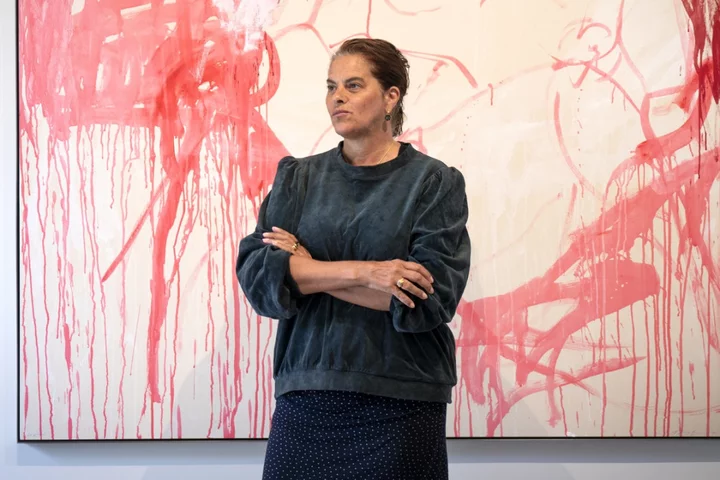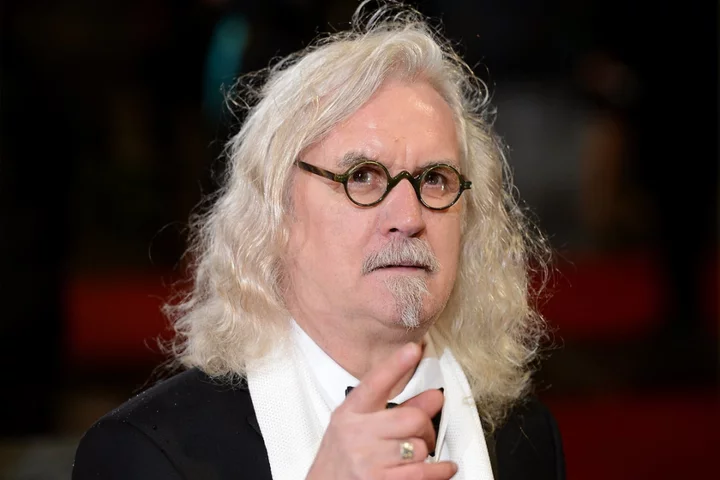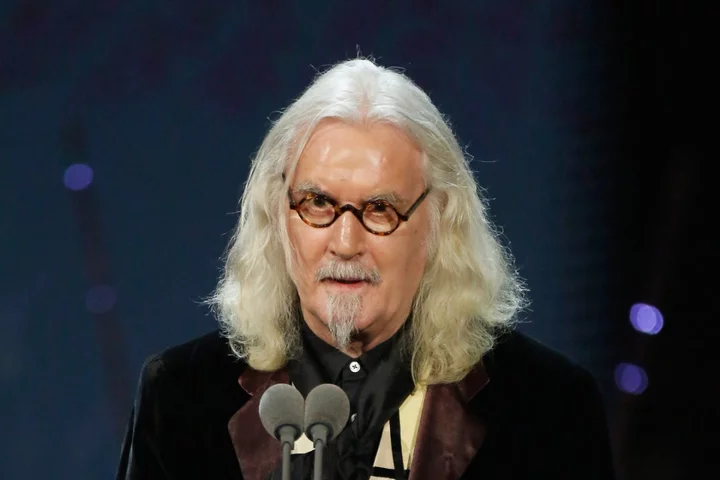
Tracey Emin says she ‘totally accepted death’ following cancer diagnosis: ‘That’s what kept me alive’
Tracey Emin has opened up about “totally accepting death” when she was diagnosed with an aggressive form of bladder cancer in 2020. In June 2020, visual artist Emin was diagnosed with cancer, and subsequently underwent a series of major surgeries, including a full hysterectomy, as well as the removal of her urethra, bladder, lymph nodes, and part of her vagina and intestine. In April 2021, she shared that the cancer was “gone” after the surgery. In a new interview with The Times, Emin, 60, explained that upon her diagnosis, she was told that there was no guarantee the surgery would be successful in removing the cancer. At the time of her diagnosis, Emin said that she had feared being “dead by Christmas”. As a result, the Turner Prize nominee explained: “I totally accepted death – absolutely, totally.” “I think accepting death on such a profound level was what’s kept me alive,” she said. “I thought, you know what? Death looks after itself. We all die – now I’ll look after living. “I realised that my life has never really been living. I’ve been just dying. I’ve been so nihilistic. I thought, this is gonna change – if I get through this I want to look forward to things and I want to be present.” Emin, 60, now has a stoma (an opening on the abdomen connected to the urinary system allowing waste to be diverted out of the body) and uses a urostomy bag, which she will need to use for the rest of her life. On International Women’s Day in March, Emin penned a powerful personal essay in The Independent about her relationship with her body after surgery. Here, the artist admitted that she “hated” her bag, “but most days I’m philosophical; knowing that it keeps me alive”. She recalled: “One of my greatest golden moments was when my entire bag came off in Chanel on Bond Street: a tsunami of p*** cascading down my body crashing to the champagne-carpeted floor. Everyone was lovely and understood, Chanel even sent me a beautiful bouquet of flowers.” For the article published in The Independent, Emin created an exclusive acrylic on canvas artwork, titled “Marriage to Myself”. She also shared a candid photograph of herself standing in front of a full-length mirror with her white urostomy bag visible. While Emin works almost exclusively in the paint medium now, in June she unveiled three bronze doors that she secretly worked on for the re-opening of the National Portrait Gallery following a substantial £44m redevelopment. Etched in individual panels on the doors are 45 female faces, which Emin explained were inspired by facets of her “soul”. Emin said that her arrangement with the National Portrait Gallery was that she was not paid for the work (the gallery only paid the production fees), in exchange for total creative freedom. “It wasn’t a commission,” she explained. “I did it for free. I think the gallery wants to push the idea of portraiture in a different way. “There’s so many different ways to experience somebody’s, let’s say, soul. It doesn’t just have to be what they look like. It could be a portrait of the soul, for example. It could be lots of different things. So I think they wanted it to move away from the idea of classic portraiture. To stretch it.”
2023-11-11 21:30

What are the symptoms of Parkinson’s disease and how can it be treated?
Parkinson’s disease is the world’s second most common neurodegenerative disorder, behind Alzheimer’s disease. While it’s unknown exactly why people develop the condition, according to Parkinson’s UK, experts believe its a combination of genetic and environmental factors that contribute to the damage of nerve cells in the brain. So what are the symptoms of Parkinson’s disease and how can it be treated? Here’s everything you need to know. What is Parkinson’s disease? Parkinson’s disease is a degenerative neurological condition. This means that over time the brain of an individual living with the disease becomes more damaged, the NHS explains. A person living with Parkinson’s disease doesn’t have enough of the chemical dopamine in their brain, the Parkinson’s Foundation states. Dopamine is responsible for transmitting signals between nerve cells in the brain. When an individual experiences a loss of nerve cells in the brain, this causes a reduction in the quantity of dopamine in the brain. What are the symptoms? The main symptoms of Parkinson’s disease include involuntary shaking (otherwise known as tremors), movement that’s slower than usual and stiffness in the muscles, the NHS outlines. Other symptoms may include difficulty balancing, nerve pain, incontinence, insomnia, excessive sweating, depression and anxiety. For more information about the symptoms of Parkinson’s disease, visit the NHS here. How many people does it affect? Around 145,000 people in the UK are affected by Parkinson’s disease, Parkinson’s UK explains. This means that around one in every 350 adults is living with the degenerative condition. According to the NHS, symptoms of Parkinson’s usually develop after the age of 50. However, for every one in 20 people affected by the disease, symptoms may appear when they’re under the age of 40. The Parkinson’s Foundation outlines that men are 1.5 more likely than women to be affected by the condition. High-profile individuals to have been diagnosed with Parkinson’s include former US president George H. W. Bush, Back to the Future star Michael J. Fox and The Chase star Paul Sinha. How can it be treated? While there is no known cure for Parkinson’s disease, symptoms may be controlled through treatment. The most common form of treatment used for the condition is medication, Parkinson’s UK states. “Drug treatments aim to increase the level of dopamine that reaches the brain and stimulate the parts of the brain where dopamine works,” the charity explains. The medication used to treat Parkinson’s disease varies according to each patient. This is because as symptoms of the disorder progress, the drugs used to treat the condition may need to be changed. While drug treatment may help to manage Parkinson’s symptoms, it cannot slow the progression of the disease. The NHS explains that those living with Parkinson’s disease may also undergo physiotherapy, occupational therapy, and, in rare cases, brain surgery to treat the condition. For more information about Parkinson’s disease, visit Parkinson’s UK. Read More What are symptoms of coronavirus – and where has it spread? Latest travel updates as coronavirus continues to spread Can face masks really protect you against coronavirus or flu? The dirty truth about washing your hands Billy Connolly shares health update on Parkinson’s disease: ‘Every day gets stranger’ Tracey Emin says she ‘totally accepted death’ following cancer diagnosis Nicky Hilton calls out critics who made negative comments about nephew Phoenix’s head
2023-11-11 21:28

Billy Connolly shares health update on Parkinson’s disease: ‘Every day it gets stranger and more different’
Billy Connolly has said that every day spent living with Parkinson’s disease “gets stranger”, as he shared an update on his health. The Scottish actor, 80, has been living with the condition since 2013, and said that the symptoms and lifestyle impacts of the disease often “creep up” on him. Parkinson’s is a brain disorder that causes unintended or uncontrollable movements, such as shaking, stiffness, and difficulty with balance and co-ordination. Often, the disease can become more severe over time. “Every day it gets stranger and more different,” the retired stand-up comedian told The Times. Connolly said that his newfound love for making drawings, painting and sculptures has helped him navigate the mental health toll of living with the condition. “I don’t know how I would have coped without drawing. It’s taken me out of the scene and put me somewhere else, where I can survey it from a different angle,” he said. “Art has made my life magical at a time when I thought it would be unbearable.” It’s been a decade since Connolly received his Parkinson’s diagnosis. The comedian was walking through the lobby of a Los Angeles hotel in 2013 when a fellow guest, a doctor, stopped him and said he shows physical signs of Parkinsons. This prompted Connolly to visit his doctor. “I’ll never forget what he said: ‘You have the gait of a Parkinson’s man,’” Connolly told the publication. According to Parkinson’s UK, Bradykinesia, which is a common condition among people with Parkinson’s, means slowness and a reduced range of movement when walking. It can make your steps smaller and it can take more time and effort to get around. When Connolly received his official diagnosis, he was also diagnosed with prostate cancer and gallstones in the same week. “It was a helluva week,” he said. “It got funny. My daughter Scarlett was with me in the ambulance on the way to the gallbladder surgery through Manhattan. The sirens were going – nee-naw nee-naw – and she said to me, ‘Is this your first Caribbean cruise?’ That’s a line I always said to her to make her laugh when her surroundings were awkward or boring.” During an interview published in September, it was revealed that Connolly had suffered “a couple of serious falls” and once broke his hip as a result of deteriorating balance. He no longer drives. Despite these growing physical challenges, the What We Did on Our Holiday star maintains a positive outlook on his health. In his memoir, Rambling Man: Life on the Road, which was released earlier this year, Connolly clarified that he doesn’t feel “close to death”. “You see, reports of my recent demise have been greatly exaggerated,” he stated in an extract shared with The Telegraph. “There was a week a few years ago where on Monday I got hearing aids, Tuesday I got pills for heartburn, and Wednesday I received news that I had prostate cancer and Parkinson’s disease. But despite all that, I never ever felt close to dying.” Rambling Man: Life on the Road is available now. Read More What are the symptoms of Parkinson's disease and how can it be treated? Tracey Emin says she ‘totally accepted death’ following cancer diagnosis Nicky Hilton calls out critics who made negative comments about nephew Phoenix’s head What are the symptoms of Parkinson's disease and how can it be treated? Tracey Emin says she ‘totally accepted death’ following cancer diagnosis Nicky Hilton calls out critics who made negative comments about nephew Phoenix’s head
2023-11-11 21:18

ITA Airways in Talks on €300 Million Loan to Expand Fleet: Messaggero
ITA Airways, the successor to Alitalia, is in talks with several banks for a €300 million ($321 million)
2023-11-11 20:23

US House Republicans eye plan to avert government shutdown as Moody's warns
By David Morgan WASHINGTON U.S. House of Representatives Republicans are due to unveil a stopgap measure on Saturday
2023-11-11 19:45

Ukraine Recap: Meeting Set for Monday on Poland Trucking Dispute
Ukrainian and Polish officials plan to meet Monday in a bid to resolve blockades at Poland’s border that
2023-11-11 19:27

Ukraine war: Kyiv hit by first air attack in 52 days, say authorities
Elsewhere, near the Black Sea port of Odesa, there were reports of at least two missile attacks.
2023-11-11 18:27

Charting the Global Economy: IMF Sees a Soft Landing for Europe
Europe’s economy is expected to avert a recession, but getting inflation back to normal levels may take several
2023-11-11 18:25

Egypt Inflation Slows in October as Presidential Elections Near
Egyptian inflation eased from a record high to its lowest level in four months ahead of December’s presidential
2023-11-11 17:58

Japan’s Premier Vows to Secure Funding to Boost Defense: NHK
Japan’s Prime Minister Fumio Kishida said he will secure the necessary funding to build the defense capabilities required
2023-11-11 16:27

Israel Latest: 30,000 More People Left Northern Gaza for South
A further 30,000 people left areas in northern Gaza for the south on Friday while only 30 more
2023-11-11 14:56

Sinn Féin ard fheis: Mary Lou McDonald plots path to power in Ireland
Mary Lou McDonald's conference speech in Athlone comes ahead of a big year for the party.
2023-11-11 14:50
